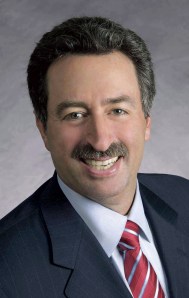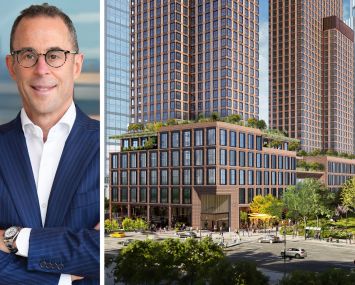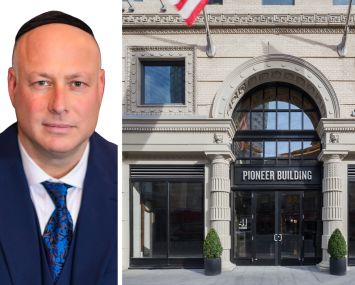Fried Frank Partner Jonathan Mechanic on the New York Genome Center
By Carl Gaines August 9, 2012 7:00 am
reprintsJonathan Mechanic, a partner at Fried Frank and chairman of the firm’s real estate department, represents clients in every type of commercial real estate transaction. His deals have included Conde Nast’s 1-million-square-foot lease at One World Trade Center and, more recently, the 170,000-square-foot bite that the New York Genome Center took out of 101 Avenue of the Americas.

The Commercial Observer: What are some of the most recent leasing deals that you’ve helped to put together?
Mr. Mechanic: The New York Genome Center, which is this center for genome science that signed this past week for 160,000 feet at 101 Avenue of the Americas, owned by Edward Minskoff.
How did they find such a huge block of space, in Midtown South of all places
Well, they were looking for a long time for the right space, which had the right attributes in terms of both lab space, research space and office space and something that would be a striking office for inducing scientists around the world to come and spend time at the Genome Center. And they looked at several alternatives, and then Minskoff actually sought them, saying “I thought this was the perfect building for you.” They spent time looking at it and analyzing it and ultimately we came to terms. There were some negotiations over several months of the lease because there were various complexities—they’ve got their own separate entrance, how the lobbies interacted, the auditorium where they can hold seminars and courses. And it just turned out to be the right place at the right time—right for the Minskoff organization and right for the Genome Center.
It sounds like Minskoff wooed them to a certain extent.
I think Minkoff wooed them to come there, and then, spending a lot of time looking at it, it turned out to be a very good solution for them, so it was kind of a win-win.
In addition to tenant rep, can you talk about the other types of representation that you tend to busy yourself with the most?
Well it’s both tenant representation and landlord representation. I’ve also represented George Comfort in the lease to Nomura of a million feet at Worldwide Plaza, and obviously sitting on the tenant side, representing Condé Nast at 1 World Trade Center, which is probably the most momentous leasing deal of certainly my career. In terms of having an impact on the city, an impact on Lower Manhattan, the change in terms of a large media company making a commitment to Lower Manhattan … all those were pretty exciting.
What do you think of recent talk about the leasing at the World Trade Center being stalled?
I think there are deals or people looking at space in the Trade Center. I think they’re extraordinary buildings. You have commitments that have already been made at 1 World Trade Center. If you go back into history, people said the same things about 7 World Trade Center, but I represented Moody’s when they took 700,000 feet at 7 World Trade and now it’s 100 percent leased. All the stuff that’s going on Downtown in terms of the retail activity and residential activity all bodes well for that space, and I think in terms of new construction there are very limited alternatives. There’s Hudson Yards and the Trade Center and the Boston Properties building on Eighth Avenue, but they’re more limited.
Going back to leasing, what types of tenants are you most busy representing? Are they tech tenants?
I represented Morgan Stanley, a financial services tenant, in taking over a million square feet in 1 New York Plaza. That signed a couple of months ago, so I think you’re seeing different types of tenants in the marketplace. Certainly you’re seeing law firms in the marketplace. And the array of tenants has varied, from the professional services firms to financial services. With financial services you see some consolidation. There’s also some uncertainty in terms of the regulations and what regulations are going to ultimately look like and how that’s going to impact how the banks look going forward. I’ve dealt with all different types of tenants. My partner, Rob Sorin represented Google on buying 111 Eighth Avenue and has since spent lots of time taking additional space back for the benefit of Google because of their expansion plans. So I think we see stuff in many different sectors, and both on the landlord and tenant side as well as doing development deals.
Do you think the future is bright in New York City as far as tech is concerned?
I think the future is very bright in New York as far as tech is concerned.
You do so many different types of transactions. Is there any kind that is most exciting for you to work on?
I guess I love doing things that have an impact on the city. I think working on the Trade Center transaction for Condé Nast had that kind of impact. It’s nice to work on iconic properties—we represented Tishman Speyer when they bought 200 Park, which is the Met Life Building. So every time you drive up and down Park Avenue, you see it. It’s rewarding. Working on the Lipstick Building. Buying, leasing it to Latham & Watkins, selling it and then ultimately representing the lender on a restructuring of the debt when the people who bought it ran into some difficulty because of the downturn in the market. So I just love the city. I think this city is the most vibrant, exciting city in the world and I’m happy to be a part of it.


